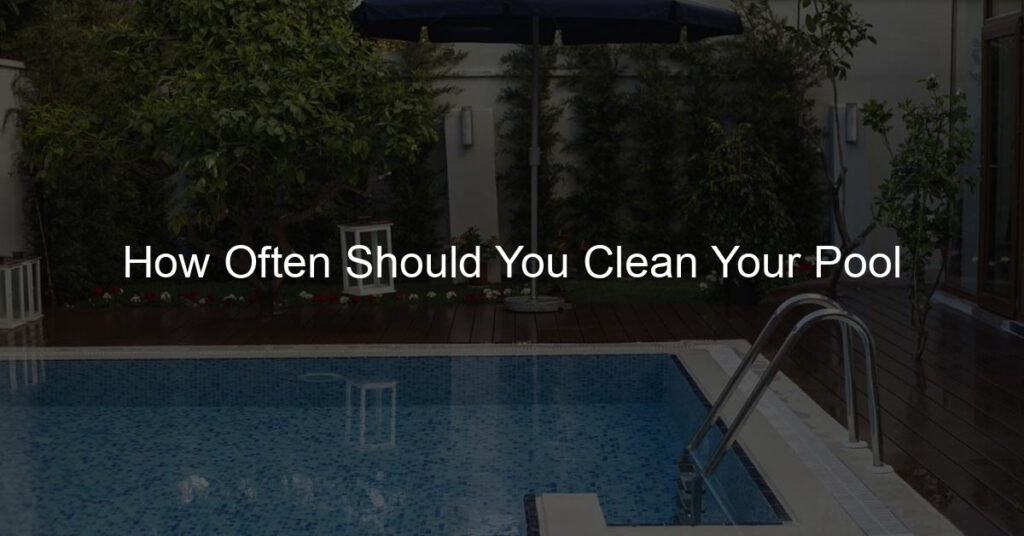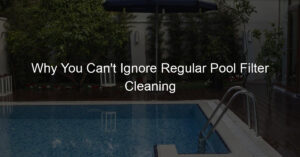Having a swimming pool in your backyard is a luxury, but it also requires regular maintenance to keep it clean, safe, and functional.
A well-maintained pool not only enhances the enjoyment of your swimming experience but also extends the life of your pool equipment.
Understanding how often should you clean your pool can be confusing for many pool owners, so this article is aimed at providing guidance on how often you should clean your pool to keep it at its best.
The frequency of pool cleaning depends on various factors such as the size of the pool, its usage, and the environment around it.
Typically, it’s a good idea to skim and brush your pool at least once or twice a week to remove debris and prevent algae growth.
Additionally, you should check and adjust the chemical balance of your pool on a regular basis to ensure a safe and comfortable swimming environment.
Moreover, it’s essential to clean your pool filter monthly and consider professional pool cleaning services as necessary, especially during off-seasons.
Key Takeaways
- Regular pool maintenance, including surface cleaning, chemical balance monitoring, and filter cleaning, is essential for an enjoyable and safe swimming experience.
- The frequency of pool cleaning varies depending on pool size, usage, and environmental factors, but weekly skimming, brushing, and chemical adjustments are typically recommended.
- Off-season maintenance and professional pool cleaning services can help extend the life of your pool and its equipment.
Understanding Your Pool’s Cleaning Requirements
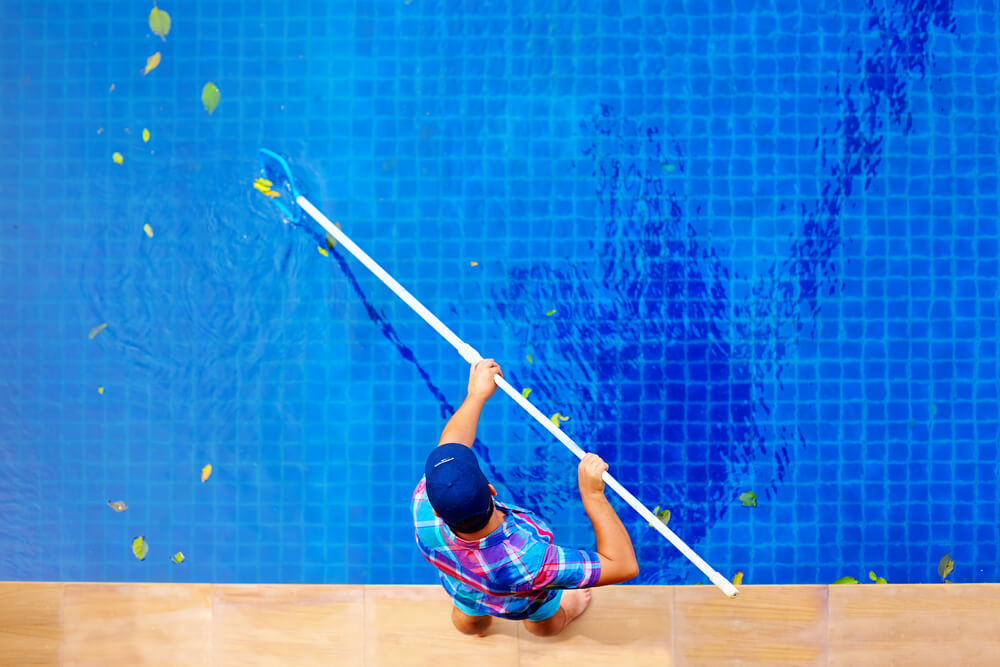
To maintain a clean and healthy swimming pool, it’s essential to understand your pool’s cleaning requirements.
The frequency of cleaning depends on various factors like the season and the amount of debris that falls into your pool.
Firstly, consider the season. During peak swimming season, it is essential to clean your pool at least once a week.
This will help prevent the buildup of dirt and bacteria, ensuring the water remains safe for swimming.
In contrast, during the off-season, you may need to clean your pool less frequently. However, it is still crucial to check your pool regularly for debris and proper water balance.
Next, assess the amount of debris that falls into your pool. If your pool is exposed to a lot of leaves, bugs, and other pollutants, consider cleaning at least twice a week.
Removing this debris promptly will help prevent issues like algae growth and water imbalance. Investing in a pool cover can also help protect your pool from unwanted debris.
Proper pool maintenance also includes monitoring water chemistry. Make it a habit to test your water 1-2 times per week.
Regularly balance the pH and alkalinity levels, maintain sanitizer levels, and shock your pool bi-weekly to keep your water clean and healthy.
In addition to these factors, don’t forget about the need for regular brushing and skimming. Aim to brush your pool at least once or twice per week, focusing on the walls, floor, and corners.
This helps prevent algae buildup and keeps your pool surface clean. Make sure to skim the surface regularly with a skimmer net to remove any floating debris.
By understanding your pool’s cleaning requirements, you’ll be better equipped to maintain a clean, safe, and enjoyable swimming environment.
Regular maintenance will also help extend the life of your pool and prevent costly repairs down the line.
How Often Should You Clean Your Pool
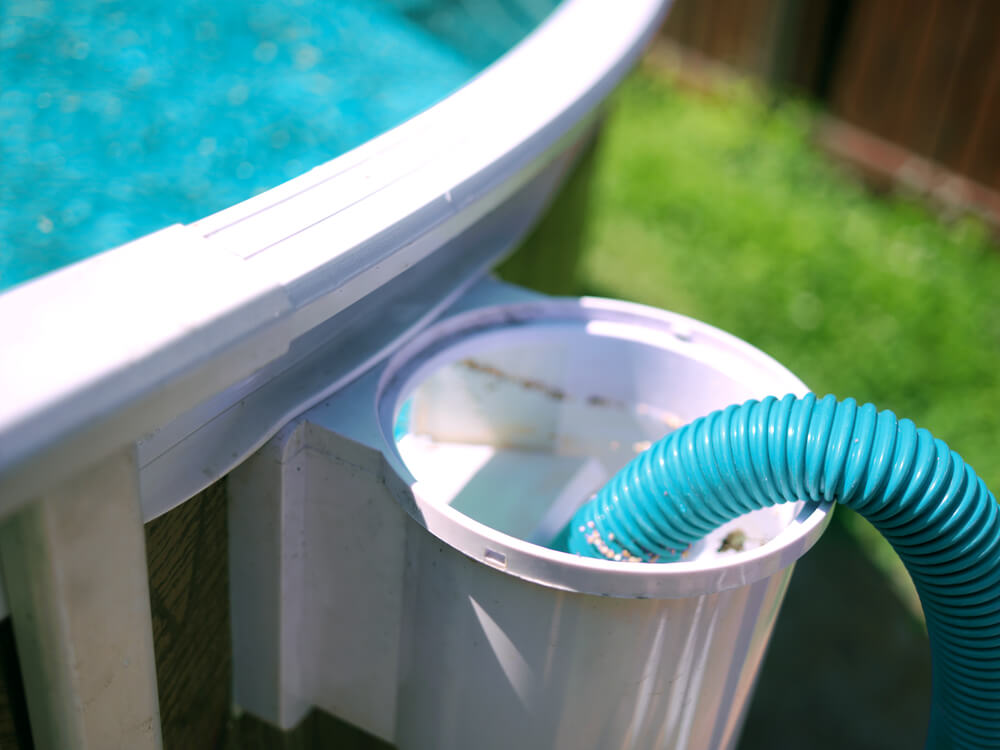
Maintaining the cleanliness of your swimming pool is essential for both the appearance and the health of those who use it.
This section will provide information on how often to clean your pool’s surface, focusing on cleaning pool walls and floor, and managing pool debris.
Cleaning Pool Walls and Floor
It is important to clean your pool walls and floor regularly to prevent the buildup of algae and debris. Aiming to brush your pool at least once or twice per week is a good practice.
This should include scrubbing the pool walls, floor, corners, and every inch of the pool to maintain a pristine condition.
Dedicate your attention to areas where dirt and algae accumulate, as they can affect your pool’s water quality and overall appearance.
This source recommends using both a pool brush and pole when brushing your pool to make the task more manageable.
Managing Pool Debris
Skimming and vacuuming your pool surface regularly is necessary for removing debris and maintaining clean water. It is generally recommended to clean your pool’s surface at least once a week to prevent the buildup of debris and algae.
However, if you have a high number of swimmers using the pool or live in an area with high winds or dust, you may need to clean your pool more frequently.
Debris can come in many forms, including leaves, bugs, and dust. You can use tools such as skimmer nets to collect larger debris from the surface of your pool.
Regularly emptying your pool’s skimmer baskets and cleaning your pool filter will also contribute to a cleaner pool environment.
Remember to test and balance the water chemistry of your pool at least once a week. This is vital for maintaining sanitizer levels and keeping your pool clean and healthy.
Professional maintenance and inspections are also advised alongside your regular cleaning routine to ensure the overall cleanliness of your pool.
Chemical Balance Monitoring and Adjustment
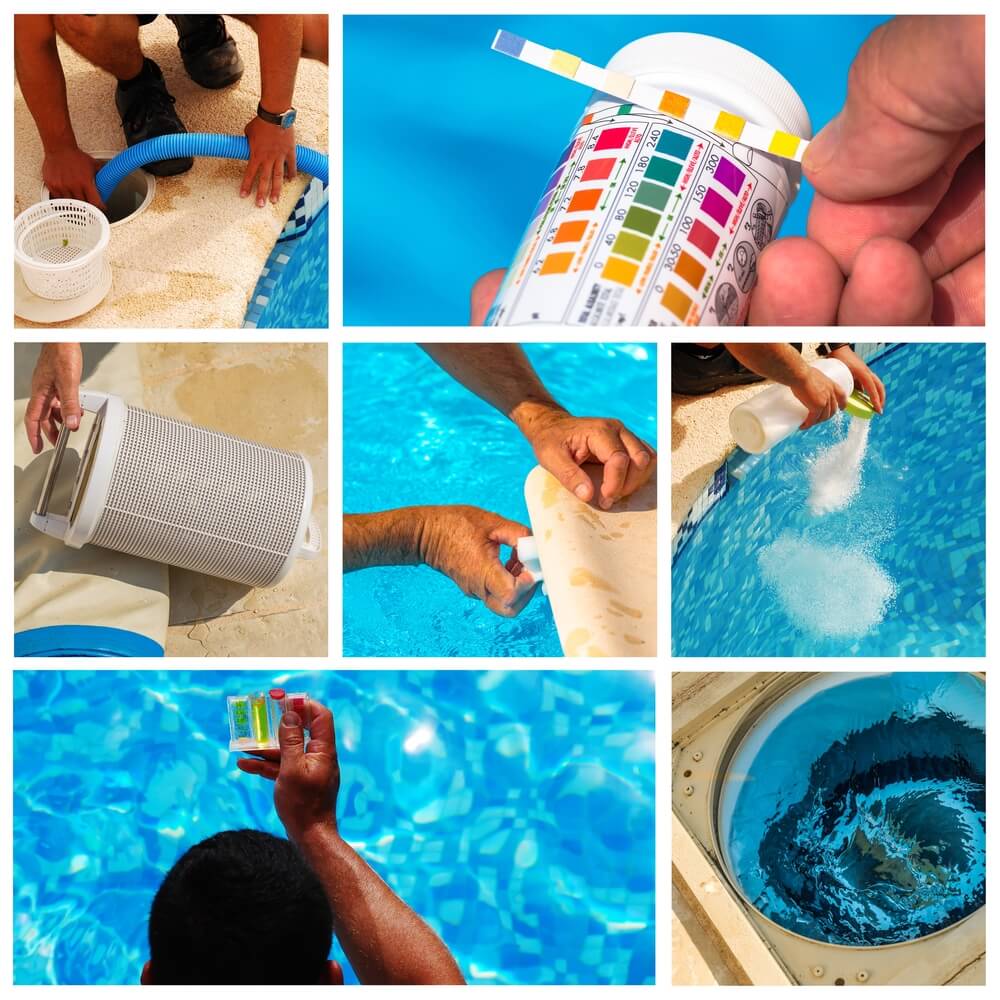
Maintaining a healthy pool involves regularly monitoring and adjusting the chemical balance of your pool water.
Proper chemical balance helps prevent harmful bacteria from thriving and ensures a comfortable, safe swimming environment for you and your guests.
One of the first steps in maintaining your pool’s chemical balance is to test the water at least two or three times per week.
Frequent testing helps detect any imbalances early, which allows you to make prompt adjustments before serious problems develop.
There are different testing methods available, such as test strips, liquid test kits, or digital testers. Choose the one that best suits your skills and budget.
The key elements you should focus on when monitoring your pool’s chemical balance are the pH, alkalinity, and sanitizer levels.
The ideal pH level for pool water is between 7.4 and 7.6. To achieve this, you will need pH increasers and decreasers to maintain the proper level of acidity or alkalinity.
Alkalinity is another critical factor in chemical balancing, as it affects the water’s pH stability. Keep the alkalinity level within the recommended range of 80-120 parts per million (ppm).
This will minimize the chances of sudden fluctuations in the pH, making it easier to control the pool’s overall chemistry.
Sanitizer levels, such as chlorine or bromine, must be maintained within their respective recommended ranges to effectively kill bacteria, control algae growth, and remove organic contaminants.
Chlorine levels should be consistently between 2-4 ppm, while bromine levels should be kept between 4-6 ppm.
To fix any chemical imbalances, you can add specific chemicals directly to the pool water. For example, to raise the pH, add a pH increaser, such as soda ash. To lower the pH, use a pH decreaser like muriatic acid or sodium bisulfate.
When adjusting alkalinity, you can use sodium bicarbonate or muriatic acid. To raise sanitizer levels, add an appropriate amount of chlorine or bromine tablets or shock treatments.
Remember, proper chemical balance monitoring and adjustment is crucial for maintaining a healthy, safe, and crystal-clear pool.
By staying diligent with your pool maintenance schedule, you’ll always have a welcoming and enjoyable swimming environment.
Importance of Filter Cleaning
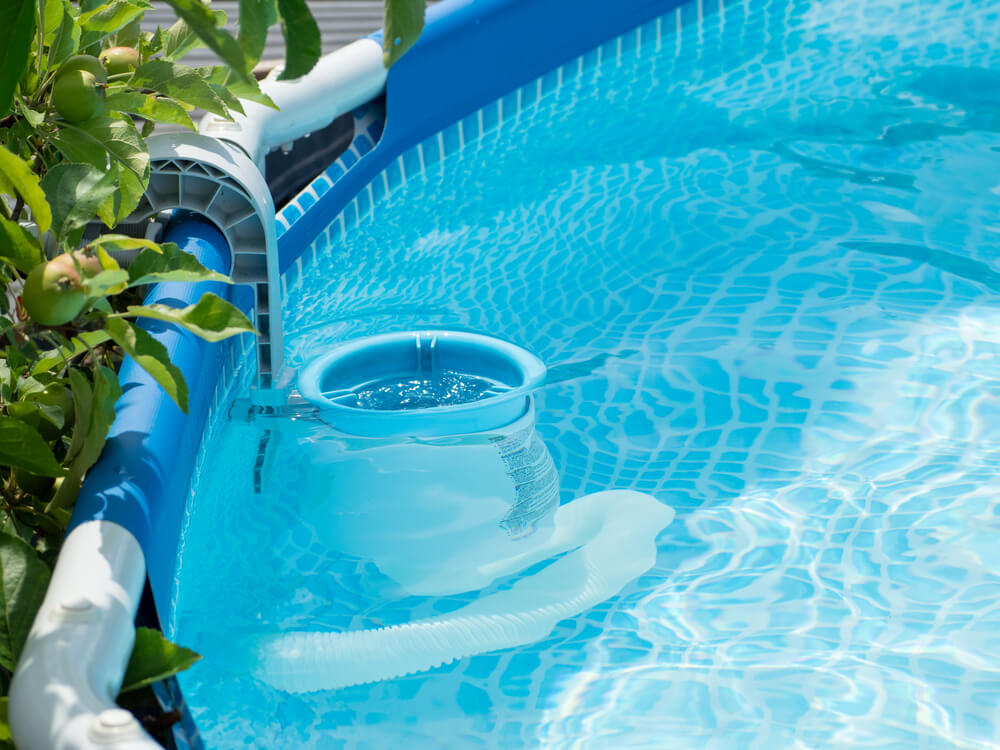
When to Clean Pool Filters
Filters are crucial for keeping your pool clean and free from dirt, debris, and contaminants. Their primary purpose is to maintain the water’s clarity and hygiene.
It’s essential to clean your pool filters regularly, as this will extend their service life and ensure your pool remains safe and enjoyable for all users.
The frequency of filter cleaning depends on factors such as pool usage, filter type, and environmental conditions.
A general guideline for pool filter cleaning is once a month during the swimming season and possibly less often during the off-season.
However, if your pool is heavily used or encounters considerable debris and contamination, you may need to clean the filters more frequently.
For cartridge and DE filters, it is recommended to clean them every 3-6 months, and for sand filters, you should backwash them every month.
Steps to Clean Pool Filters
The process of cleaning your pool filter may differ depending on the type of filter you have.
Fortunately, it’s relatively straightforward and can usually be completed within an hour or so. Below are brief guidelines on cleaning the three common types of filters:
Cartridge Filters
- Turn off the pool pump and relieve the system pressure.
- Remove the cartridge from the filter housing.
- Rinse the cartridge using a garden hose, starting from the top and working your way downward. Ensure you clean between the cartridge pleats.
- Inspect the cartridge for damage or excessive wear; replace if necessary.
- Reinstall the cartridge in the filter housing and restore the pool pump operation.
Sand Filters
- Turn the pool pump off and set the filter valve to “backwash” mode.
- Turn the pump back on and let it run for a few minutes, until the sight glass shows clear water.
- Turn off the pump again and set the filter valve to “rinse” mode.
- Turn the pump back on and let it run for approximately 20-30 seconds.
- Turn off the pump, set the filter valve to “filter” mode, and resume normal operation.
DE Filters
- Turn off the pool pump and set the filter valve to “backwash.”
- Turn the pump back on and let it run until the sight glass shows clear water.
- Turn off the pump, add fresh DE powder to the skimmer, and set the valve to “filter.”
- Turn the pump back on and resume normal operation.
To keep your filter working efficiently, it’s vital to learn how to clean it and follow the recommended maintenance schedule.
Proper filter cleaning will improve water clarity, prolong filter lifespans, and help maintain the overall health of your pool.
Professional Pool Cleaning Services
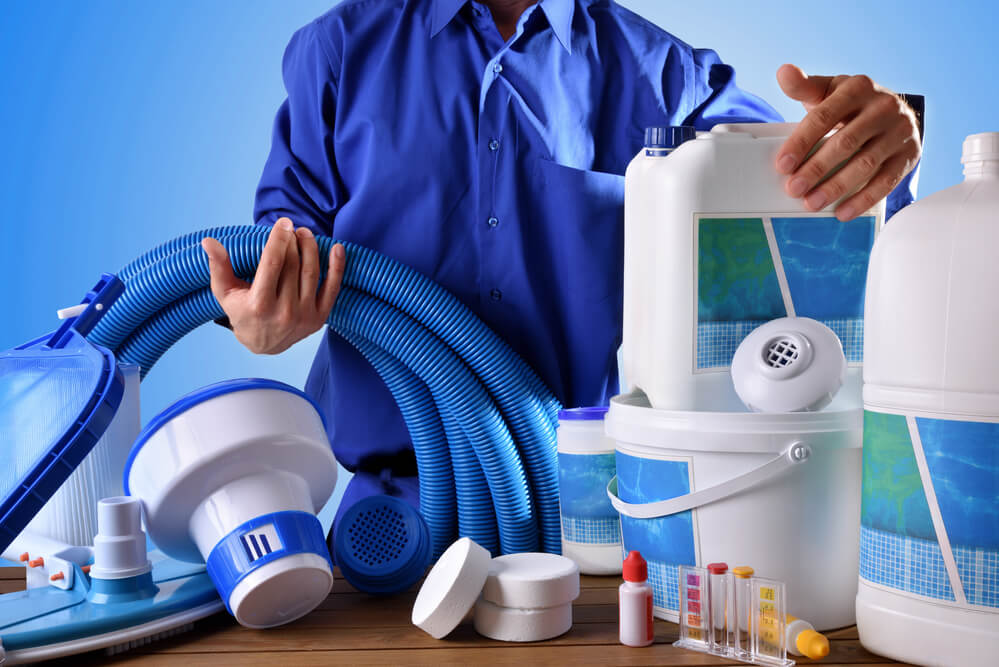
When it comes to maintaining the cleanliness and health of your pool, hiring professional pool cleaning services might be a wise choice.
These trained experts can take care of various tasks, allowing you to enjoy your pool without the hassle of constant upkeep.
One of the main benefits of hiring a professional pool cleaning service is their ability to develop and implement a customized maintenance schedule based on your pool’s specific needs.
Typically, pools should be cleaned at least once a week, but if your pool has heavy usage or unique features, a professional can recommend a more frequent cleaning schedule.
Professionals are also trained to quickly identify and address any issues pertaining to your pool. This includes checking chemical levels, water balance, and filter operation.
They have the knowledge and tools to accurately test and adjust these elements, ensuring a safe and enjoyable swim experience.
Further, they are skilled at identifying and repairing any potential problems, like leaks and damaged pumps, before they become costly repairs.
Another advantage of using a professional pool cleaning service is the time and effort saved. They will efficiently perform tasks like skimming debris from the pool surface, vacuuming the floor, and brushing the pool walls.
With their expertise, they are likely to do a more thorough job than an untrained person.
Hiring a professional pool cleaning service can save you time, ensure a properly maintained pool, and provide peace of mind.
By taking care of the regular maintenance, they allow you to focus on enjoying your pool rather than worrying about its upkeep.
Maintaining Your Pool in Off Seasons
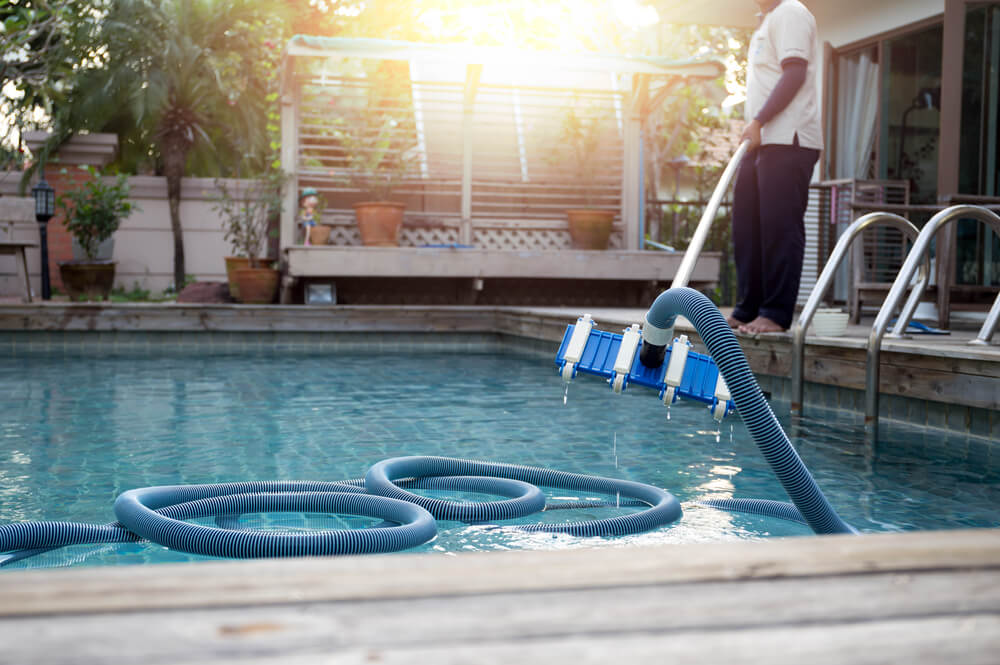
During off seasons, it’s important to keep your pool well-maintained to prevent any damage that might occur due to changing weather conditions.
Begin by testing your pool water to make informed decisions about its needs. Ensure you follow the testing kit instructions carefully for accurate results.
Then, balance the pH and chlorine levels as well as add algaecide and stain prevention chemicals.
It’s crucial to avoid damage to your pool equipment and plumbing during freezing weather. Keep an eye on your freeze guard to ensure proper circulation when temperatures drop.
In off-seasons, you won’t be dealing with swimmers, so you can adjust the frequency of some maintenance tasks.
For example, add shock to your pool every other week instead of on a weekly basis.
To stay on top of your pool care routine, follow a maintenance schedule that includes daily, weekly, monthly, and annual tasks.
Some tasks you should continue performing during off seasons include:
- Monitoring sanitizer levels, keeping them between 1-3 parts per million (ppm)
- Maintaining alkalinity at 80-120 ppm
- Keeping pH levels between 7.2 and 7.6
- Ensuring calcium hardness remains between 150-400 ppm
Additionally, having your pool inspected and serviced during the winter season is a smart investment.
Professionals will check for signs of damage or wear in your cleaning equipment and make recommendations based on their findings.
By adhering to these off-season pool care tips, you’ll protect your investment and minimize the work needed to prepare your pool for the swimming season.
Conclusion
In order to maintain a clean and safe swimming environment, it is essential to clean your pool regularly.
As a general rule, cleaning your pool once per week is recommended, particularly during the busy seasons between spring and summer.
Yet, if this is not feasible, try to clean it at least once per month.
To keep your pool in top condition, consider adhering to a routine that includes daily brushing of walls, steps, and ladders, as well as skimming the surface.
Also, it’s important to vacuum your pool once a week or use an automatic cleaner. Regularly testing and balancing the water chemistry, such as pH, alkalinity, and sanitizer levels, cannot be overlooked.
Lastly, remember that every pool is unique, and factors such as its size, location, and usage may influence the frequency and intensity of cleaning required.
By consistently monitoring and maintaining your pool’s cleanliness, you are not only protecting your investment but also ensuring a safe and enjoyable swimming experience for everyone involved.
Frequently Asked Questions
How frequently should a pool be drained?
Draining your pool entirely is not a common occurrence and depends on various factors, such as water quality and local regulations.
Generally, pool water needs to be replaced every 3 to 5 years. Always consult with a pool professional before deciding to drain your pool.
What is the recommended pool cleaning schedule?
It’s recommended to follow a regular cleaning schedule to maintain your pool in optimal condition. Skim the surface daily, brush walls, steps, and ladders in low circulation spots.
Vacuum your pool once a week or use an automatic cleaner. Test the pool water chemistry 1-2 times per week to ensure proper pH, alkalinity, and sanitizer levels.
Shock your pool bi-weekly to keep the water clean and clear.
How often should chlorine be added to a pool?
Chlorine levels should be tested 1-2 times per week and maintained between 1-3 ppm. This ensures that your pool remains clean and safe for swimming.
The frequency of adding chlorine can depend on factors like pool usage, sunlight exposure, and water quality.
Make sure to consistently monitor the chlorine levels and adjust them as needed.
What are essential pool maintenance tasks?
Essential pool maintenance tasks include skimming, brushing, and vacuuming the pool’s surfaces, testing and adjusting water chemistry, cleaning filters, and maintaining sanitizer levels.
It’s also important to inspect and maintain pool equipment, such as pumps, heaters, and filter systems, to ensure they operate efficiently.
Is daily pool cleaning necessary?
Daily pool cleaning tasks, such as skimming the surface and brushing walls, steps, and ladders in low circulation spots, help maintain the overall cleanliness of your pool.
Though not all tasks need to be done daily, developing a habit of performing these tasks regularly is essential in maintaining a healthy and inviting pool environment.
Should you hire a professional for pool maintenance?
Hiring a professional for pool maintenance depends on your comfort level, time availability, and budget.
While many pool owners prefer to handle their pool maintenance tasks, others choose to hire a professional to ensure that the pool is consistently clean and well-maintained throughout the swimming season.
Evaluate your personal situation and determine if hiring a pool professional is right for you.

